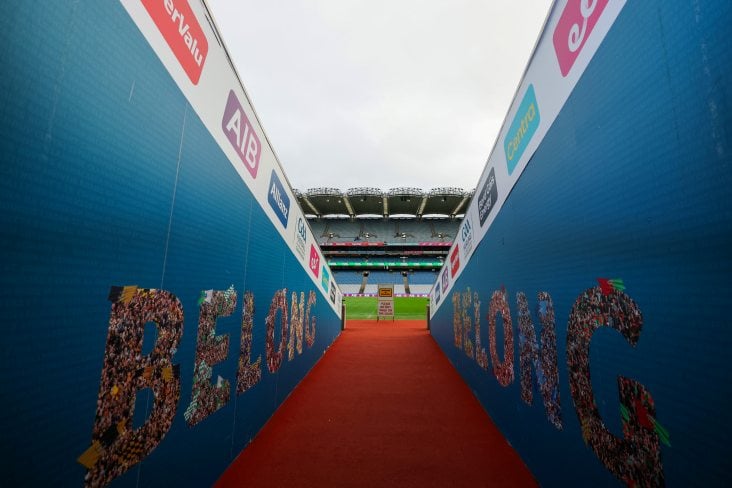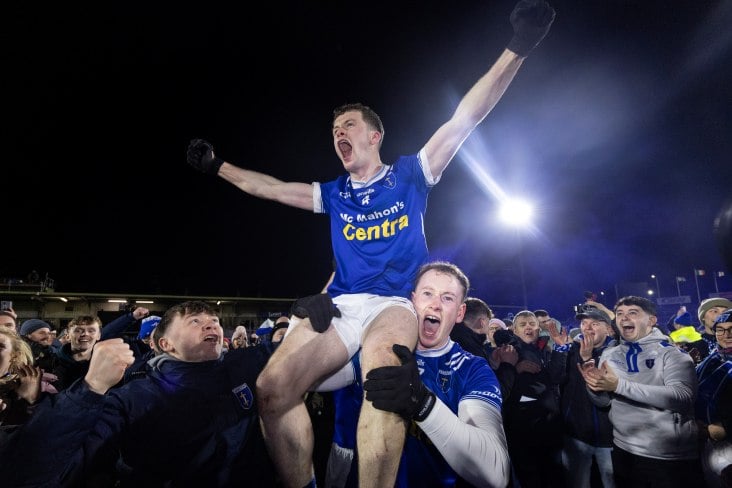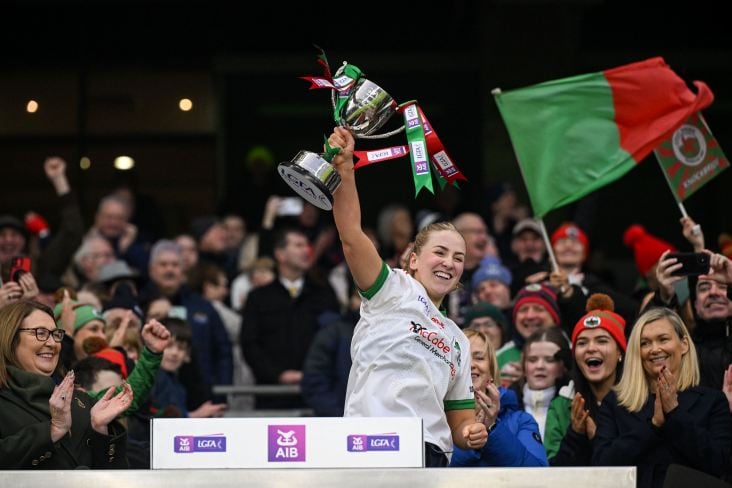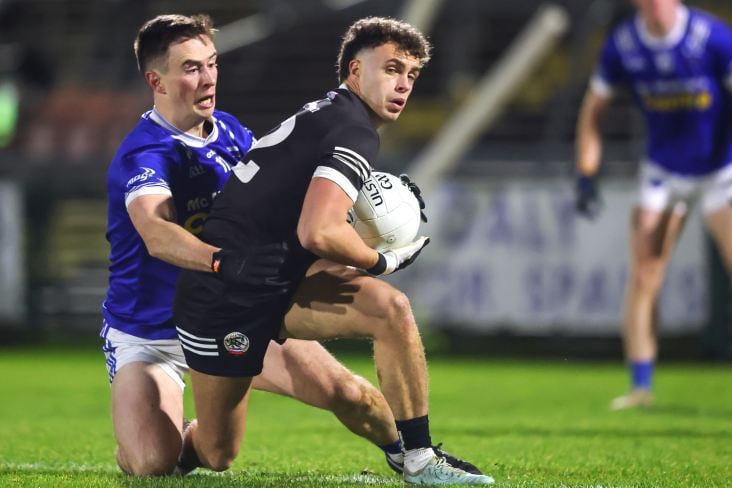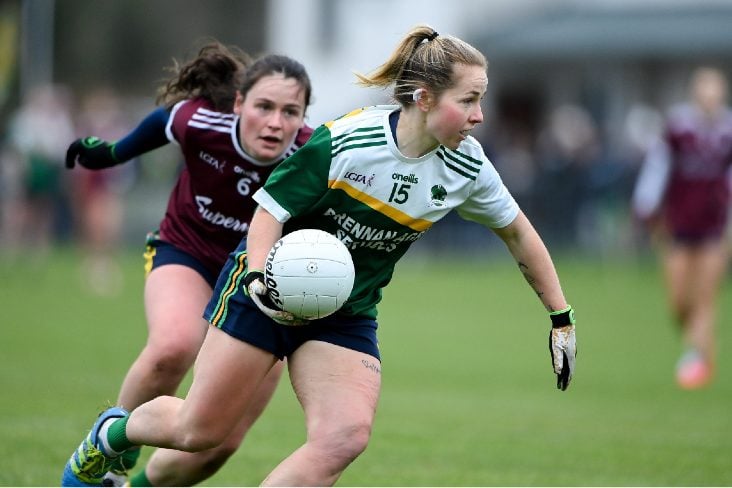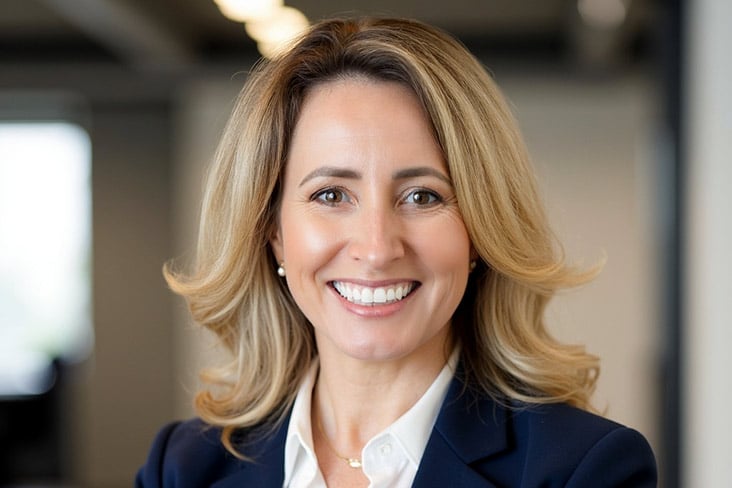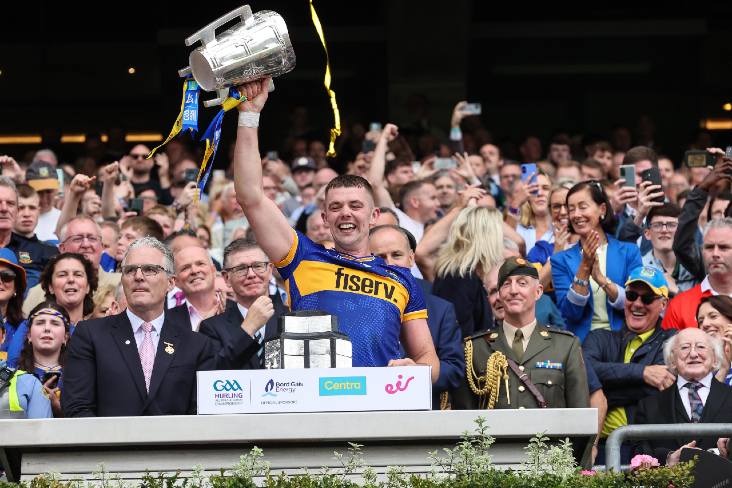Celebrating 125 years of the GAA
December 31, 2009The GAA celebrated its Centenary back in 1984 when a series of events, conferences, competitions and publications celebrated the achievement of reaching that 1st century of service. Back at the beginning of December 2008 the GAA at national level announced details of their 125th anniversary celebrations with a calendar of events that they believed would celebrate, commemorate and challenge the association's membership in this special year and at this special time. The purpose of celebrating the 125th anniversary was to illustrate, and also celebrate the fact that the GAA is at the very heart of every community in the country and events would be held right across the country throughout the year. The celebrations allowed the association at all levels to reflect on what the GAA is all about, the promotion of Gaelic games and the promotion of Irish culture and the fact that the GAA has given people a sense of place and an identity in each community over the years.
The celebrations in 1984 were of a different nature but the GAA is now a much more developed organisation and the whole thrust of the 125th celebrations was that this generation of GAA people would leave a legacy and leave something that people going into the future could dedicate themselves to and use as a template for further development. Early in the year events were held to commemorate the foundation of the association and the values that led to its foundation, indeed the circumstances that dictated the need for an association like the GAA back in the dim and distant past of the 1880s. One thing that was decided by the National Committee was that nothing would be organised that involved extra games because the games program at club and inter county level is already crowded enough.
In 1984 the Centenary Cup was one of the major events with Monaghan reaching the final where they were beaten by Meath but at this stage in the GAA's games program there simply is not room for a similar competition. Celebrating the 125th anniversary gave the association at club; county, provincial and national level an opportunity to look at themselves, where they had come from and more importantly where the association was going. The GAA has a huge cultural and historical legacy to pass on and this year could be used to consolidate that particular aspect of association activities. There were a series of events, conferences, lectures and all manner of things at national level but two very important dates were set aside, Schools Day on April 24th and Lá na gClub on Sunday, May 10th.
The 125 Committee in Monaghan acted as a co-ordinating body for activities for Lá na gClub, the chief of which was the unveiling of a plaque by every club in the county, but prior to that Schools Day offered all of the children in every parish in the county the opportunity to get involved in this unique celebration and to be part of the wider GAA family. Some schools went to great ends to mark the special day but the main thing was that all schools took part.
Prior to that one major event had been held in Monaghan, Scor 40, the celebration of forty years of Scor, the cultural wing of the association, with a gala dinner and special concert involving former All Ireland Scor winners.
The Oral History Project was one of a number of important initiatives launched and funded by the GAA to celebrate 125. The idea was have face to face interviews with as wide a range of GAA people as possible and with the findings of the project to be published in book form, a DVD would also be issued and the material was to form the basis of a documentary style film later in the year.
The big date in the 125 calendar was definitely LA NA gCLUB which was an outstanding success. Sunday, May 10th was set aside by the Association as one of the most special dates in the whole calendar of activities that was spread right across 2009. The day was special in that it was set aside for the clubs alone to give them an opportunity to organise a series of events that would commemorate the 125th anniversary in fitting style in each and every club right across the country and even abroad. The club is the bedrock of the Association and La an gClub was a re-affirmation of the true basis on which the GAA was founded, has survived, is surviving and will develop going into the future because it is the members, the players and supporters of our clubs that sustains the GAA as one of the great amateur sporting associations in the world. The GAA has always reflected the society in which it operated over the years and that has changed in many ways with the passage of time, from the formative years to where the Association, including the on-field activities, has developed into a key social and cultural institution that is providing leadership within each and every community in this country. La na gClub was an opportunity for clubs to demonstrate that they have cemented their position as the leading organisation in their communities and that gaelic sports and activities will provide a base for future generations to show that the passion and commitment of the clubs will continue to give that real sense of identity to the communities that they serve. There was no specific plan of action drawn up for that special day as it was left to the inventiveness and imagination of each individual club to decide in what way they wanted to celebrate this landmark date. One club in Monaghan, Inniskeen was formed even before the GAA itself as their initial date goes back to 1883 and they like all the others grasped the opportunity with enthusiasm to reflect on what the GAA meant to them and how it has served their community and their people. Clubs right across the county drew up plans that would encompass every single strand within their membership from the very youngest to their more senior citizens and especially to include former officers and former players. Central to the celebrations was the unveiling of the specially commissioned 125 Plaque and the raising of the Monaghan 125 Flag, both symbols of the strength of the GAA as an organisation but also reflecting the fact that it is the club that is the lifeblood of the Association. Along with that the diversity in their approach to celebrating this date is central to the whole ethos of the GAA as an organisation. Some clubs started their day of celebration in very fitting fashion with a Mass for all deceased members and their agendas went on from there to involving local primary schools in a range of activities, to organising cultural events, parades, barbecues, fun games, novelty games, entertainment in traditional music song and dance and all manner of activities that provided an opportunity for each and every person in every parish to play a part or to just come along and simply enjoy an occasion of great celebration. Others planted trees, buried time capsules and launched web sites. Quite a number of clubs involved hurling activity in their list of events but the main theme running through all of the clubs' lists of activities was that everything was fun based. The founding fathers back in 1884 could never have envisaged such things as the launch of a web site some 125 years later to celebrate what they had done but what they did in that dim and distant past was to establish values that are still at the very heart and soul of the Association and no doubt they would be pleased when witnessing how the clubs and their members celebrated 125 years of ongoing achievement and development.
Lá na gClub in Monaghan got under way early on Sunday May 10th last when representatives of the Management Committee and the 125 Committee met in Cloghan to unveil the commemorative plaque and raise the Monaghan 125 flag. It was fitting that Cloghan was part of the celebrations as it is essentially "a club project" and should be recognised as such. County chairman John Connolly did the honours along with a number of officers of the county committee, Secretary Ailish McEntee, Treasurer Marion Donnelly and Ulster delegate Declan Flanagan, the chairman of the 125 committee, John P Graham and Gary Carville a member of the 125 committee. Speaking after the unveiling of the 125 Plaque county chairman, John Connolly paid tribute to the 125 Committee and the clubs who had organised so many different events.
"A day like this shows that our clubs are at the very heart of all our communities and that has always been the case. The events also show that there is so much great work going on in all our clubs to promote gaelic games and our clubs showed energy and vision in putting this whole programme of events together."
Given Monaghan's impact and influence during the early years of the GAA in Ulster the 125 Committee decided that a History and Heritage Night be organised to explore a number of themes and look at the influence of a number of people. The Iontas Theatre in C'Blayney was the perfect setting and the atmosphere was added to substantially by the Harp music of Fionnuala Rooney.
Sunday October 25th marked the 125th anniversary to the very day of Cumann Luthchleas Gael but Friday October 30th was as close as the Monaghan 125 committee could get to a date that was part of the weekend of celebration that was called for by the Association at national level. Just as in 1884 when word went out about the meeting to form the Association, word had been circulated some weeks earlier by Croke Park with suggestions on how clubs and counties could mark the exact birthday although the founding fathers could not have foreseen in even their wildest dreams the methods of communication that would be used 125 years to the day from their momentous and groundbreaking meeting in Hayes' Hotel in Thurles, Co. Tipperary. It was a day when an association was formed that helped to shape the nation and that aspect of the early days of the GAA in Monaghan and Ulster was amply illustrated as Donal McAnallen and Dr Paddy Duffy gave a great insight into the people and the events that helped shape the fledgling association back then. Gary Carville looked at the more recent influences that have affected Monaghan. Donal McAnallen, a graduate of NUI Galway demonstrated his vast knowledge of the early years of the Association in Ulster with particular reference on the night to Monaghan and in the process gave a different perspective and even threw new light on certain events that up until now had been taken as one-off happenings or events that had happened in isolation. The period that he covered, particularly the 1920s and into the 30s was a highly charged time politically in Ireland with the emerging Nationalist movement gaining momentum and the GAA being strongly associated with it. His talk also dealt with objections to the GAA, the Parnell split and other factors that were central to events at that time and he reflected too on how Monaghan had enjoyed the high level of success they did in those early years. He did point out that a lot of the material he was covering was as a result of research that is being conducted at the moment for a forthcoming book that he is co-editing on the early days of the Association and his hugely enlightening talk ended with two minutes of film footage from the famous, or indeed infamous, 1930 All Ireland football final between Monaghan and Kerry.
Patrick Whelan
A talk on the early life and times of Patrick Whelan by 125 Committee Chairman John P Graham, supplemented the subject matter of Donal McAnallen's talk outlining as it did the huge influence that Whelan was to have in helping to establish the Ulster Council after it's somewhat faltering start in 1903. Whelan in his time was to see and witness major social, economic, political and military upheaval but he was a man who played a huge part in helping to establish not only the Ulster Council but also in getting the GAA on a firmer footing. He was one of the people who was responsible for the purchase of the ground that is now Croke Park, being then one of its first trustees. He was a man who was very active politically, he was a Justice of the Peace and Coroner for north Monaghan and he took a full and active part in the new Volunteer movement that is now being so closely associated with that period in the development of the GAA. Despite his trojan efforts though he was to ultimately become a victim of circumstances as he was the casualty of the decision by Central Council that anyone who had taken the Oath of Allegiance was ineligible for membership of the GAA. Despite the fact that all civil servants, including teachers, had to take the oath, Whelan would appear to have been the only victim of the implementation of the decree at provincial level and the association that he had done so much to foster and nurture during difficult times totally abandoned him.
Population changes
Dr Paddy Duffy, Professor of Geography in the National University of Ireland in Maynooth in a wide-ranging address spoke off the "mid-century challenges" that affected not only the Association but the county of Monaghan and the country generally and using a power point presentation he was able to illustrate how emigration and the declining population as well as social change had been the major factors that affected the GAA. His talk also centred on social activities and he outlined how life in Ireland changed both during and after the Second World War, the increase in the number of cars available radically altered the social scene and the benefits the Rural Electrification Scheme brought but there was always a picture of an ever decreasing population. The figures that he produced also showed that the big gap in Monaghan's Ulster championship success coincided with the years of mass emigration which led to a radically changing landscape and in an analysis of those figures he was able to demonstrate that the most drastic impact was in the age ranges that were particularly relative to club activity. He was able to intersperse his talk with excerpts from the diaries that had been kept by his late father, Patsy Duffy, a founder member and first secretary of the Cremartin club back in 1934 which all led to a most enjoyable trip down memory lane and that in its own way also added to the wider perspective in which things are now being viewed.
Modernisation
Gary Carville, a former PRO and chairman of Monaghan county board, delivered the final talk of the evening on the "Modernisation of the GAA in Monaghan" covering the period from just before Centenary Year, 1984, right up to the present day. As a person who has an abiding interest in history and whose current course of study at the Mater Dei Institute includes a module on Irish studies Gary Carville was well placed to give an astute analysis of the period that saw Monaghan regain some of its former status on the inter county scene and again make an impact at national level. His talk explored the changes that were implemented at administrative level, the club development programme that saw the clubs of Monaghan developing facilities that were on a par with the best and better than most in the country but most of all of the period that saw Monaghan again back among the honours at inter county level with Ulster championship and National Football League success especially in the 1980's. The County Board at this stage was led by chairman Paraic Duffy, a man who was to go on to become Director General of the GAA while the fortunes of the Monaghan team were guided by Sean McCague who was to go on and become President of the Association at the turn of the century. On the club front Monaghan was making an impact with Scotstown and Castleblayney winning Ulster club championship titles and two clubs from the county instituting competitions that were later to become official Ulster junior and intermediate club championships, Cremartin with the junior series and Clontibret with the intermediate, all indications of the forward thinking that now pervaded the GAA at all levels in the county. The jewel in the crown though was the development of a County Teams Training Centre at Cloghan, a scheme that encompassed the terms of three county chairmen but eventually one that produced facilities for the training and development of players that will help to keep Monaghan right up there with the very best.
At the conclusion the speakers along with Fionnuala Rooney were presented with a special Plaque to commemorate the occasion.
Gala Banquet concludes
125 celebrations
The night of Friday December 4th saw the conclusion of the GAA's 125th Anniversary celebrations in the county with a Gala Banquet and presentation night in the Hill Grove Hotel. In speaking of the 125th Anniversary celebrations MC for the night John P Graham gave a brief outline of how the GAA has featured in Monaghan over the past 125 years. In that time 22 different people have served in the position of chairman of the county board, 27 have been elected to the position of vice-chairman and 31 to the position of secretary, although three of those were joint secretaries, 8 people have held the position of County Treasurer since 1904, 15 have held the position of assistant secretary since 1936 and Monaghan has had 7 Central Council delegates since 1947. 65 different people have represented the county on the Ulster Council since 1904 with Patrick Whelan the first delegate in 1904. Monaghan now has the distinction of also supplying both a President of the GAA, Sean McCague and the current Ard Stiurthoir, Paraic Duffy.
Playing record
Over the last 125 years Monaghan have won the Ulster senior football championship on 14 occasions from the first in 1888 to their last championship in 1988, winning 12 of those between 1888 and 1938. Monaghan have won only three championships since 1938, in 1979, 1985 and 1988. Over the history of the Ulster championship four Monaghan players have figured as top scorers, Sean Woods was top scorer in 1969 with 3-7, Kieran "Jap" Finlay was top scorer in 1979 with 1-18, hitting 1-9 of that in the Ulster final of that year, a record that stood for 20 years, Eamonn McEnaney was top scorer twice in 1981 with 1-17 and 1985 with 3-16 while Tomas Freeman was top marksman in 2007 with 1-15.
On the club front since 1888 15 clubs have won the Monaghan senior football championship, Castleblayney are top with 37 titles, a Monaghan and national record with Scotstown and Clontibret in joint second place with 14 titles each. 21 clubs have won the intermediate football championship and 34 different clubs have won the junior football championship. Seven clubs have won the Monaghan senior hurling championship which gives a picture of Monaghan and its part in the playing end of the games over the last century and a quarter.
Captains, All Stars and
World Champions
On the county scene the main concentration on the night was recognising Monaghan's achievements since 1984, two Ulster senior football championships in 1985 and 1988, a National Football League title in 1985, Ulster and All Ireland Junior hurling championships in 1997 as well as an Ulster in 1998, an All Ireland B championship in 1998 and a National Football League division 2 title in 2005 as well as an All Ireland Masters title in 1998. Special guests on the night were the players who had captained Monaghan to those Ulster and All Ireland championships and National League success.
There was also special recognition for those players who had been awarded All Stars and special mention for Monaghan's two World handball Champions.
The Captains
Special presentations were made to:
- Gene Sherry who captained Monaghan to the Ulster SFC & NFL title in 1985
- To Ciaran Murray who captained Monaghan to the Ulster SFC in 1988 and won an All Star 1985,
- To Ciaran Connolly who captained Monaghan to Ulster and All Ireland JHC titles in 1997 and an Ulster JHC in 1998
- To Edwin Murphy who captained Monaghan to an All Ireland "B" Football Championship in 1998,
- To Damien Freeman who was captain when Monaghan took the NFL Division 2 title in 2005 and to Bernard Connolly who was captain of the Masters team when they won the All Ireland Masters title in 1998.
The All Stars
Since the All Star Awards were first introduced in the 1970's Monaghan has picked up five gongs, the first in 1979 when Nudie Hughes was named at right full back. He went on to add two more in 1985 and 1988 to join an elite All Stars club nationally for those who have three awards. Special presentations on the night were made to Nudie Hughes, an All Star in 1979, 1985 and 1988, to Paddy Linden an All Star in 1988, Ray McCarron who won his award in 1986 and Tomás Freeman who picked up his All Star in 2007
World Champions
Among the special guests on the night was Padraig McKenna from the St. Mellan's Handball Club, who won the World 15 & Under Handball title at the recent championships in Portland, Oregon and he was the recipient of a special presentation to mark his achievement.
Darren Doherty, from the Emyvale handball Club won two World Handball Championships at the 2009 World games, the 13 & Under singles and the One wall title but Darren was unable to be present as he was attending the National Handball Awards ceremony in Croke Park. Darren will be presented with his award at the Northern Standard/Monaghan GAA Annual Awards on January 29th.
125 Archive launched
The occasion also saw the launch of the 125 Archive, Torthai 125 Bliain, by Ard Stiurthoir Paraic Duffy. The archive was a project that the 125 Committee undertook at the start of the year, to compile a detailed statistical record of the GAA in Monaghan at club and county level from 1884 to 2009. The archive is essentially in three parts. There is a section detailing the results of all inter county competition that Monaghan took part in with details of teams that have played in Ulster and All Ireland finals. There is a section on the club championships in Monaghan including the results and details of all county finals in the senior championship since 1888 as well as results in the finals of the junior and intermediate championships and the winners of the senior hurling championship. There is a section devoted to the clubs where every club submitted its own record from detailing the founding fathers right through their playing record to what they did on La na gClub. The archive also contains details of the talks given on the occasion of the History/Heritage night as well as a full listing of all officers who have served at county committee level over the years and a full listing of all the winners on the Annual Awards scheme. In performing the launch Paraic Duffy spoke of the great loyalty that Monaghan had shown to the GAA over the past 125 years and what had been achieved both inside and outside the county. He congratulated the clubs on the marvellous facilities that they had developed which he said were second to none and would compare with the best anywhere in the country. He had special words too for the members of the 1979 team and their famous victory that brought Monaghan in from the championship wilderness after 41 years. He had particular words of praise for Sean McCague who had masterminded the breakthrough and who had gone on to mastermind two further championships in that 10-year period, 1985 and 1988, something he said "that sets him apart as one of the great managers within the GAA."
In launching the 125 Archive, Torthai 125 Bliain, Paraic Duffy described it as "a great historical record that will stand the test of time and will be there for consultation for future generations." In conclusion he congratulated the 125 Committee on organising such a function and had a special word of praise for the chairman of the 125 Committee, JP Graham stating that "there is no better person at organising such events."
The book was officially launched with editor John P Graham presenting the first copy to Paraic Duffy.
A new generation of heroes was how the 1979 team and their achievement were described at the 125 Banquet. Monaghan County Board had carried out a root and branch review of all aspects of county team affairs in 1978 with the result being that Sean McCague was appointed as team manager. The introduction of the new system though did not seem to be having any marked effect in the National League and it wasn't until the 1979 Dr. McKenna Cup competition, which Monaghan won with victories over Tyrone, Fermanagh and Armagh that signs began to emerge that Monaghan's football fortunes were on the turn.
The championship though was the big target, and Monaghan were in buoyant mood following their McKenna Cup victory. Monaghan's first round opponents were reigning champions Down but they pulled off a shock defeat and a first championship victory by the county over the Mourne men in 30 years. Monaghan did ship some criticism in the national press for robust tactics, the game being described as "a tough, rugged encounter where the tackling more than once bordered on the reckless" while another notable hack described it as "a relentless, almost ruthless display of aggressive, powerhouse football that torpedoed the champions". All roads now led to Breffni Park for the semi-final and they justified their new-found status with a thoroughly deserved victory over Armagh by 2-10 to 2-8, the final score probably not reflecting Monaghan's overall superiority to book their place in the final against Donegal.
The final on Sunday, July 22nd in Clones against Donegal was one of those moments in time, a milestone in the history of the GAA in Monaghan when a veritable tour de force by the team saw them record a deserved victory that ended the county's 41 years Ulster senior football championship famine.
Later that year Monaghan won the Ceannarus Tournament when they defeated Dublin by 0-10 to 1-5 in the semi final and Roscommon in the final by 1-12 to 1-7 but the occasion was detracted from the somewhat when everyone realised that no trophy was going to be presented. A DVD of the Ulster final was shown during the meal and elicited huge interest from among the panel of players some of whom were seeing themselves on screen for the first time.
Presentations
Speaking prior to presenting each member of the panel and the entire backroom team with a special memento to mark the 30th anniversary of Monaghan's 1979 victory president of the Ulster Council Tom Daly, himself a Donegal man, recalled his own personal disappointment on the occasion of the 1979 Ulster final. He went on though to offer warm congratulations to the players and to team manager Sean McCague on their major breakthrough at that time. He also complimented Monaghan on their service to the association particularly in Ulster and the people who had served as officers of the Ulster Council and had represented Monaghan as members of Comhairle Uladh. He congratulated the 125 Committee on the initiative that they had shown during the year and spoke of the great response there had been to the 125 Celebrations right across the province. In referring to the 125 Archive, Torthai 125 Bliain, he congratulated editor JP Graham on producing such a valuable work of reference on the GAA in the county and he also spoke of the great amount of research and book production that the 125 celebrations had precipitated.
The presentations to the team that lined out against Donegal in the 179 Ulster final started with team captain Brendan Brady and then went through the lineout: Paddy Linden, Eugene "Nudie" Hughes, Sean Hughes, Fergus Caulfield, Paddy Kerr, Sean McCarville, Eamon Tavey, Gerry McCarville, Hugo Clerkin, Gene Finnegan, Dessie Mulligan, Kevin Treanor, Kieran "Jap" Finlay and Tom Moyna. Subs: Anthony McArdle for a G Finnegan, PJ Finlay for K Treanor. Others on the panel were Pat McCabe, Martin McKenna, Seamus McCarville, Brian Rice, Bernard Connolly, Eamonn McEnaney, Brian Daly, Brendan Lillis, Donal Moyna, Gerry Brannigan, Tom McDermott, Damien McBride. Team manager Sean McCague and selector Paddy McKearney were also the recipients of presentations. The late Gerry Farrell was the physio but unfortunately his wife Roseleen was unable to attend. The late Tommy "Cla" McSkeane was the bag man, (it's kit manager now) and he was represented by his wife Anne who also did the laundry for the team back then. Peter Sherry who was county chairman in 1979 and Maura McAtavie, wife of the late Francie McAtavie who was secretary in 1979 were also present. All in all it was a great occasion with so many people meeting up for the first time in years and re-living those heady days when Monaghan came in from the cold.
125 Committee
Cathaoirleach - John P Graham (Killeevan)
Runai - Sharon McElroy (Drumhowan)
Baill - Liam Stirrat (Ard Comhairle), Poilin Ni Ruanaidh (Oifigeach Cultura & Gaeilge), Gerry Duffy (Drumhowan), Gary Carville (Cremartin), Joe Hanratty (C'Blayney), Raymond Finnegan (Inniskeen), Eugene "Nudie" Hughes ('79 team) Tweet
